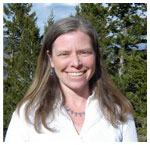The following post was written by guest blogger, Katie Asmus, MA, LPC, BMP
Complex PTSD is so very. . . well. . . complex! Those who have experienced ongoing stressful (and perhaps even abusive) life circumstances know that the impact of such a chronic state of stress is long-lasting. Our bodies and brains adapt to the stress and develop a baseline of hypervigilence – or being on guard against threat and danger – coming to expect this as the norm in life as opposed to the exception.
 So, then we come along into the picture as EMDR therapists, ready to resource, and clear the traumatic material. Voila! But. . . what if. . . feeling good, and feeling calm, is the most dangerous thing our reptilian survival brains can imagine??? Because, feeling good and feeling calm mean relaxing! Mean NOT being on guard, mean, not being ready for the threat to jump out from around the corner at us in any moment. THUS. . . relaxing. . . then, in and of itself becomes the threat.
So, then we come along into the picture as EMDR therapists, ready to resource, and clear the traumatic material. Voila! But. . . what if. . . feeling good, and feeling calm, is the most dangerous thing our reptilian survival brains can imagine??? Because, feeling good and feeling calm mean relaxing! Mean NOT being on guard, mean, not being ready for the threat to jump out from around the corner at us in any moment. THUS. . . relaxing. . . then, in and of itself becomes the threat.
How then do we create resource and safety in an internal environment where calm itself is the threat? How do we convince the nervous system that it is ok to relax when relaxing means not being ready for survival? At least for a moment or two, when there is no objective external threat present? TRICKY! It takes finesse. It takes patience. It takes understanding, experimenting, psychoeducation, not taking it personally, staying grounded, going back again and again to touch even for a breath, a sense of. . . or the possibility of. . . taking a break from looking for the danger.
Those of us who have been doing EMDR Therapy for any length of time know that attempting to bring clients to a safe or calm place is not always easy. If someone has never felt safe, and if feeling safe is not safe, then the whole body-mind system may defend against this. Thus, it requires being creative in finding alternative ways to calm the nervous system, to find ways to create relative safety. If you are looking for new and creative ways to do this with your clients, or would love to have frank conversations about the complexity of working with complex PTSD, come join the Maiberger Institute’s EMDR Advanced Training “EMDR Therapy Toolkit for Complex PTSD” in Boulder, Colorado. Please check the EMDR Training Schedule for availability.
EMDR Therapy Toolkit for Complex PTSD EMDR Training Schedule
About Katie Asmus, MA, LPC, BMP
 Katie Asmus, MA, LPC, BMP, is a Body-Centered Psychotherapist and Educator. With 17 years experience working in the wilderness, and 12 years as a clinician working with a variety of populations, Katie has spent a great deal of her career bridging the two in the field of Wilderness Therapy. After realizing the prevalence of trauma in our society, Katie focused her graduate studies and thesis work on body-centered modalities for working with trauma in the wilderness, bringing this work to the fields of Adventure Education and Wilderness Therapy. She has presented nationally for 7 years on this topic, and has published a journal article entitled, “Emotional Risk Management: Identifying and Working with Emotional Trauma in the Wilderness Setting through Body Centered Interventions”. Katie was also part of the creation and facilitation of the first Clinical First Responder Course offered at Naropa University in 2004.
Katie Asmus, MA, LPC, BMP, is a Body-Centered Psychotherapist and Educator. With 17 years experience working in the wilderness, and 12 years as a clinician working with a variety of populations, Katie has spent a great deal of her career bridging the two in the field of Wilderness Therapy. After realizing the prevalence of trauma in our society, Katie focused her graduate studies and thesis work on body-centered modalities for working with trauma in the wilderness, bringing this work to the fields of Adventure Education and Wilderness Therapy. She has presented nationally for 7 years on this topic, and has published a journal article entitled, “Emotional Risk Management: Identifying and Working with Emotional Trauma in the Wilderness Setting through Body Centered Interventions”. Katie was also part of the creation and facilitation of the first Clinical First Responder Course offered at Naropa University in 2004.
Website: http://namastehealers.com/
Image Source: “Cat, Kitten, Cute, Pet, Feline” – by blackpanther via Pixabay (CC) – 393294





